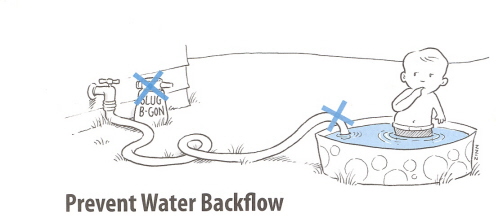7. What is backflow protection and how does it affect me?
Imagine this scenario: A woman sprays a commercial weed killer on her lawn by using a hose attachment. Afterwards she disconnects the applicator and takes a drink of water from the hose. A short time later she is admitted to the emergency room with symptoms of poisoning. What happened? At some time while the woman was spraying the weed killer, water pressure dropped, which resulted in the poison being sucked back into the hose. Later, when she drank from the hose, the poison inside was released with the water.
How do you protect yourself from backflow situations? First, keep all hoses and faucets away from direct contact with possible contaminants. Never submerge hoses in buckets, pools, tubs, or sinks. In the event of loss of water pressure, you need an air gap; otherwise, the hose will act like a straw and suck the liquid backwards.
Second, protect yourself by installing inexpensive backflow protection devices on all hoses and threaded faucets in your home. These devices are available at hardware and home improvement stores for about $4-10 each. Backflow vacuum breakers provide safety valves that prevent liquids from flowing backwards into a hose or faucet.
Specialized backflow prevention devices are available for more elaborate installations, such as built-in lawn irrigation sprinklers, hot water boilers, in-ground swimming pools, heat exchangers, active solar heating systems, private wells, and specialized commercial locations such as dry cleaners, car washes, laboratories, and manufacturers. Backflow devices ensure that potentially contaminated water cannot be drawn back into the public water supply from a business or residence in the event of a negative water main pressure situation. If you receive a letter from the Water Utility informing you that a device is due for certification and inspection, please respond as quickly as possible to protect water quality and safety. Proper maintenance of backflow prevention devices requires a periodic certification, followed by a City of Ann Arbor inspection For more information on specialized backflow requirements, contact either a plumber certified on backflow prevention devices, or the City of Ann Arbor Customer Service Center at 734.794.6333.

Return to the Consumer's Guide to Tap Water
main page
